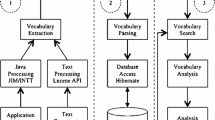Abstract
The paper deals with the problem of monitoring software development and maintenance processes. In particular, we concentrate on data reported in software bug repositories. These data characterize the progress and effectiveness of the above mentioned processes. To analyze these data we have developed a special program which extracts information from typical bug repositories (e.g. Bugzilla) and generates various useful statistics. The analysis methodology is based on problem handling graphs (PHGs) and various metrics. The usefulness of this approach has been illustrated for some real open source and commercial projects. We present the measurement methodology and interpretation of the obtained results, which confirmed their practical significance.
Access this chapter
Tax calculation will be finalised at checkout
Purchases are for personal use only
Similar content being viewed by others
References
Cinque, M. et al.: On the impact of debugging on software reliability growth analysis: a case study. In: Proceedings of ICCSA Conference, Part V, LNCS, vol. 8583, pp. 461–475. Springer (2014)
Janczarek, P., Sosnowski, J.: Monitoring software development and usage. Przegląd Elektrotechniczny. Sigma NOT R. 90(2), 117–120 (2014)
Janczarek, P., Sosnowski, J.: Investigating software testing and maintenance reports: case study. Inf. Softw. Technol. 58, 272–288 (2015)
Janczarek, P., Sosnowski, J.: Managing complex software projects. Inf. Syst. Manag. (WULS Press, Warsaw) 4(3), 171–182 (2015)
JUNG (the Java Universal Net-work/Graph Framework)—http://jung.sourceforge.net/
Madeyski, L., Jureczko, M.: Which process metrics can significantly improve defect prediction models? An empirical study. Softw. Qual. J. 23, 393–422 (2015)
Messquida, A.-L., Mas, A.: A project management improving program according to ISO/IEC 29110 and PMBOK. J. Softw. Evol. Process 846–854 (2014)
Natarajan, R.: Top 10 Open Source Bug Tracking Systems (2010). http://www.thegeekstuff.com/2010/08/bug-tracking-system/
Ogasawara, H., Kusanagi, T., Aizawa, M.: Proposal and practice of software process improvement history since 2000. J. Softw. Evol. Process 521–529 (2014)
Petersen, K.: A palette of lean indicators to detect waste in software maintenance: a case study. In: Wohlin, C. (ed.) XP 2012, LNBIP vol. 111, pp. 108–122. Springer, Berlin (2012)
Saha, R.P., Kurshid, S., Perry, D.E.: Understanding the triaging and fixing processes of long lived bugs. Inf. Softw. Technol. 65, 114–128 (2015)
Santana, F., et al.: XFlow: an extensible tool for empirical analysis of software systems evolution. In: Proceedings of 8th Experimental Software Engineering Latin American Workshop ESELAW, pp. 57–66 (2011)
Sommerville, I.: Software Engineering, 9th edn. Pearson, Boston (2011)
Sosnowski, J., Sabak, J.: Software reliability analysis in designing database oriented applications. In: Proceedings of the 27th Euromicro Conference, pp. 166–173, IEEE Comp. Society (2001)
Zhang, W., Wang, S., Wang, Q.: KSAP: an approach to bug report assignment using KNN search and heterogeneous proximity. Inf. Softw. Technol. 70, 68–84 (2016)
Zhou, J., Zhang, H., Lo, D.: Where should the bugs be fixed? More accurate information retrieval-based bug localization based on bug reports. In: Proceedings of IEEE ICSEE Conference, pp. 14–24 (2012)
https://en.wikipedia.org/wiki/Comparison_of_issue-tracking_systems
http://code.google.com/p/j2bugzilla/stronaprojektuJ2Bugzilla
Author information
Authors and Affiliations
Corresponding author
Editor information
Editors and Affiliations
Rights and permissions
Copyright information
© 2016 Springer International Publishing Switzerland
About this paper
Cite this paper
Dobrzyński, B., Sosnowski, J. (2016). Tracing Life Cycle of Software Bugs. In: Zamojski, W., Mazurkiewicz, J., Sugier, J., Walkowiak, T., Kacprzyk, J. (eds) Dependability Engineering and Complex Systems. DepCoS-RELCOMEX 2016. Advances in Intelligent Systems and Computing, vol 470. Springer, Cham. https://doi.org/10.1007/978-3-319-39639-2_10
Download citation
DOI: https://doi.org/10.1007/978-3-319-39639-2_10
Published:
Publisher Name: Springer, Cham
Print ISBN: 978-3-319-39638-5
Online ISBN: 978-3-319-39639-2
eBook Packages: EngineeringEngineering (R0)




